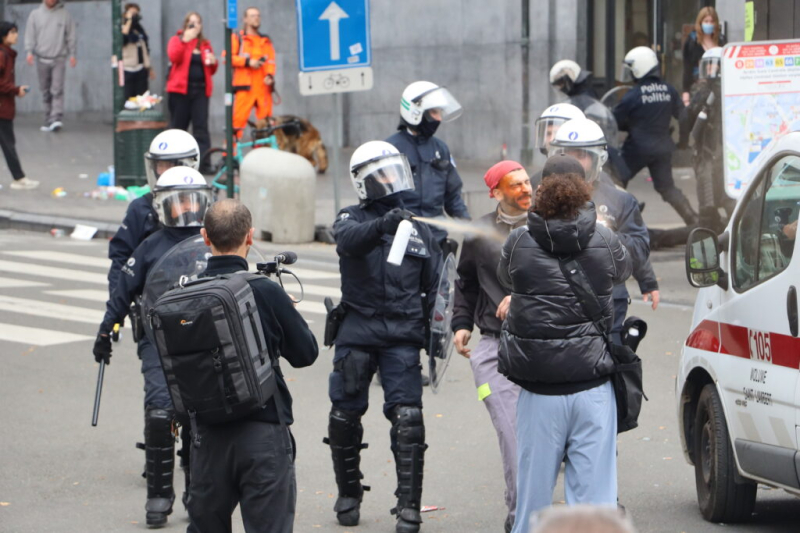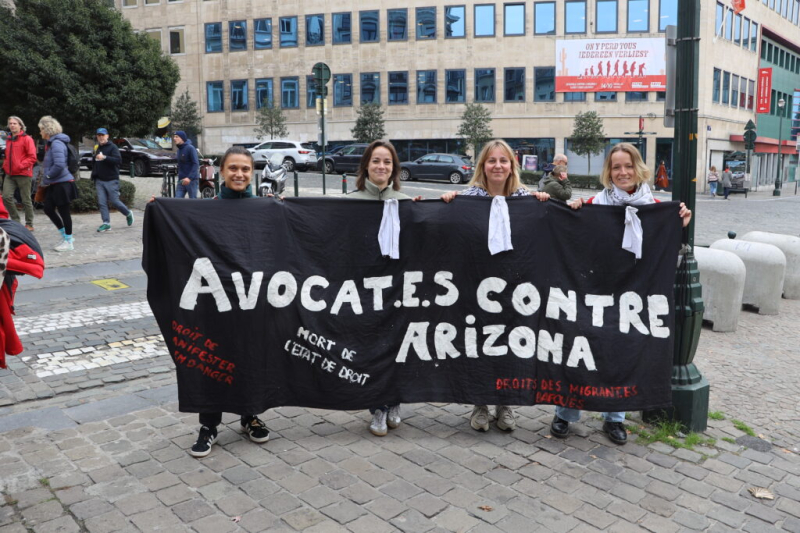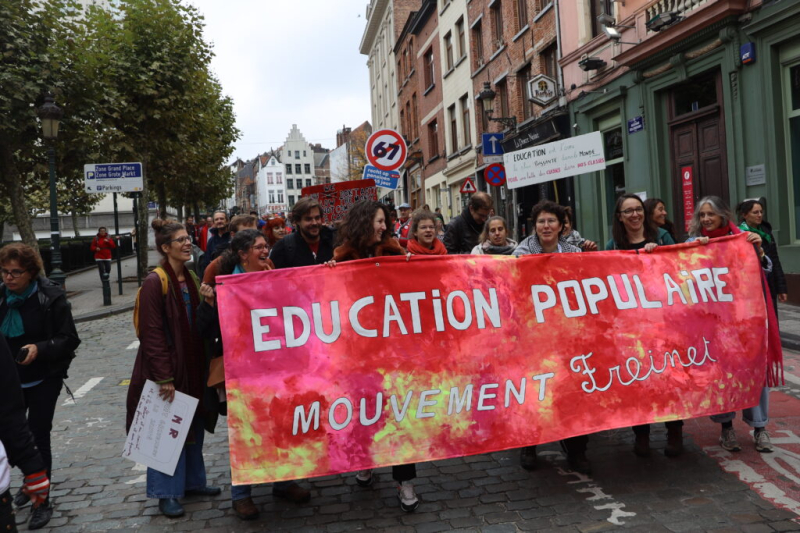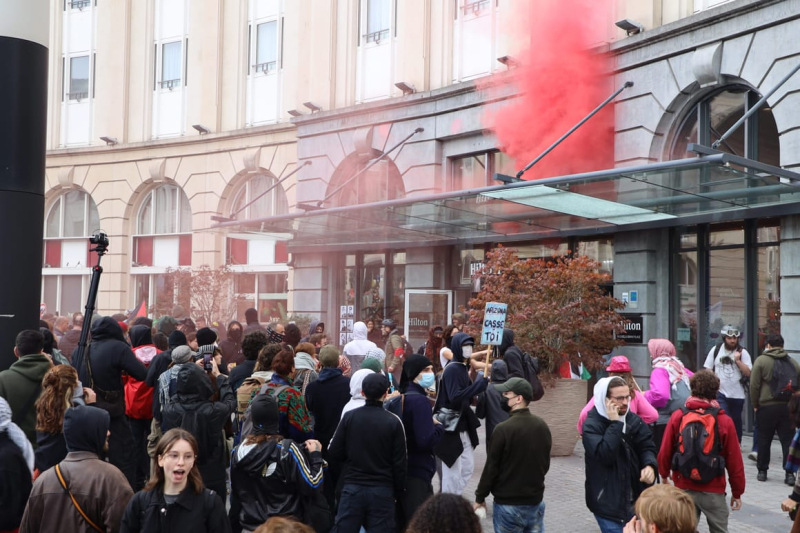Tens of thousands came to the Belgian capital to march against austerity measures and other controversial government policies.
BRUSSELS — Police arrested dozens of people and deployed tear gas and water cannon against a group of protesters at Boulevard Pachéco during a national strike that could be Belgium’s biggest in a decade.
Several people were injured after the clash with police, with some visibly shaken up and others angry with the authorities.
Belgium’s trade unions are protesting against austerity measures introduced by the right-wing government coalition led by Flemish nationalist Bart De Wever, of the nationalist New Flemish Alliance. At the center of their anger is a pensions reform that would raise the age of retirement from 65 to 67 by 2030.
“We were just marching peacefully and suddenly there were smoke bombs and police. I don’t get it. For maybe 10 troublemakers … they tear-gassed the entire crowd, the elderly, the children … It was shameful, an absolute disgrace,” said Rafael, a postal worker, whose eyes were red from the gas.
“Instead of addressing the issue, we prefer to tear-gas the entire population exercising its right to strike,” said another participant, who didn’t want to share his name.
Masked protest participants vandalized the Immigration Office building on Pachéco, with the entire incident filmed by Anneleen Van Bossuyt, Belgium’s migration minister.
“The vandalism against my services has nothing to do with the right to strike. Anyone who attacks our employees or our buildings is attacking our society. My support goes out to the staff who have to endure this. Despite the massive efforts of the police, these thugs have shown their true face,” she wrote in a post on X.

Further incidents took places in other parts of Brussels, including at a Hilton hotel opposite the Central Train Station, where protesters who threw projectiles and glass bottles faced off with police, who responded with water cannons and tear gas. The offices of political parties Vooruit and the Socialist Party were covered in graffiti.
Police have estimated that around 80,000 people came out to protest, while Thierry Bodson, head of the socialist trade union FGTB-ABVV, said as many as 140,000 were taking part. A one-day general strike in 2014 saw 100,000 people take to the streets.
Diverse mix of protesters calls on government to listen
Among the diverse group of protesters — which included workers, doctors, students, teachers and families — a clear frustration with the government’s wider policies was evident.
Several of the protesters were carrying signs and banners saying “boucherie” (French for “butchery”), a play on the name of Georges-Louis Bouchez, Belgium’s francophone liberal chief, whose center-right Reformist Movement (MR) party is part of the governing coalition. Others portrayed Prime Minister De Wever and Bouchez as butchers wielding knives.
Marine Lanoy, a lawyer for asylum-seekers, told POLITICO that she was protesting the government’s strict migration policy.
“We are here to defend our clients. Asylum-seekers, women victims of violence, people who don’t receive social aid from the state. We don’t have the habit of protesting as lawyers, so we are here for us, but also for our clients who just don’t have the possibility to be here,” said Lanoy.

Federico Dessi, director of the medical NGO Médecins du Monde in Belgium, said the Belgian government “has been taking regressive measures for almost a year.”
“On one hand, they’re undermining the rights of the most vulnerable people in society, particularly immigrants, homeless people and anyone excluded from the health care system. On the other hand, they’re also cutting funding to solidarity organizations like Médecins du Monde that try to help these people,” he said, urging the government to stop.
Eléonore Rigaux, who joined the protest with a group of mothers pushing strollers who are part of the collective “Bloc Poussette”, said she hopes it will serve as a wake-up call that sparks change.
“As a mother, I feel total anxiety. In my own situation, I don’t know how I’ll manage in a few months, and it’s really scary thinking about the future — especially for our children. There are already almost no day care places, and there will be even fewer,” she said.
Students, meanwhile, expressed their anger over the hike in annual tuition fees.
“The increase in tuition fees is unfair. There are already many students struggling to get by, and if they raise it, it’s going to be even harder,” said Dorine, a psychology student studying at the University of Mons.

“We want to promote equality and not inequality,” said Damien Van Keirsbilck, a demonstrator with a teacher’s movement demanding increased budgets for schools. “Take the money where it stands. And that is in the pocket of rich people, not the poor people.”
“There are too many children in the same room with [a single] teacher. We need more adults [supervising] the class,” added Amandine Montecchio, a teacher in Brussels.
The trade unions behind the protests say the government is ignoring their concerns and bypassing consultation on labor laws — despite Belgium’s long tradition of social dialogue with unions and employers.
“This is also something we denounce: the government doesn’t listen to anyone and acts as it pleases without consulting workers. And, of course, this is unacceptable in a country like Belgium, which has functioned in this collaborative way for a very long time,” said Alexandre Sutherland, a spokesperson for the liberal trade union CGSLB.
De Wever’s office has declined to comment. None of the police, MR or the New Flemish Alliance responded immediately to requests for comment.
CORRECTION: This article has been updated to correct the spelling of Eléonore Rigaux’s name.

